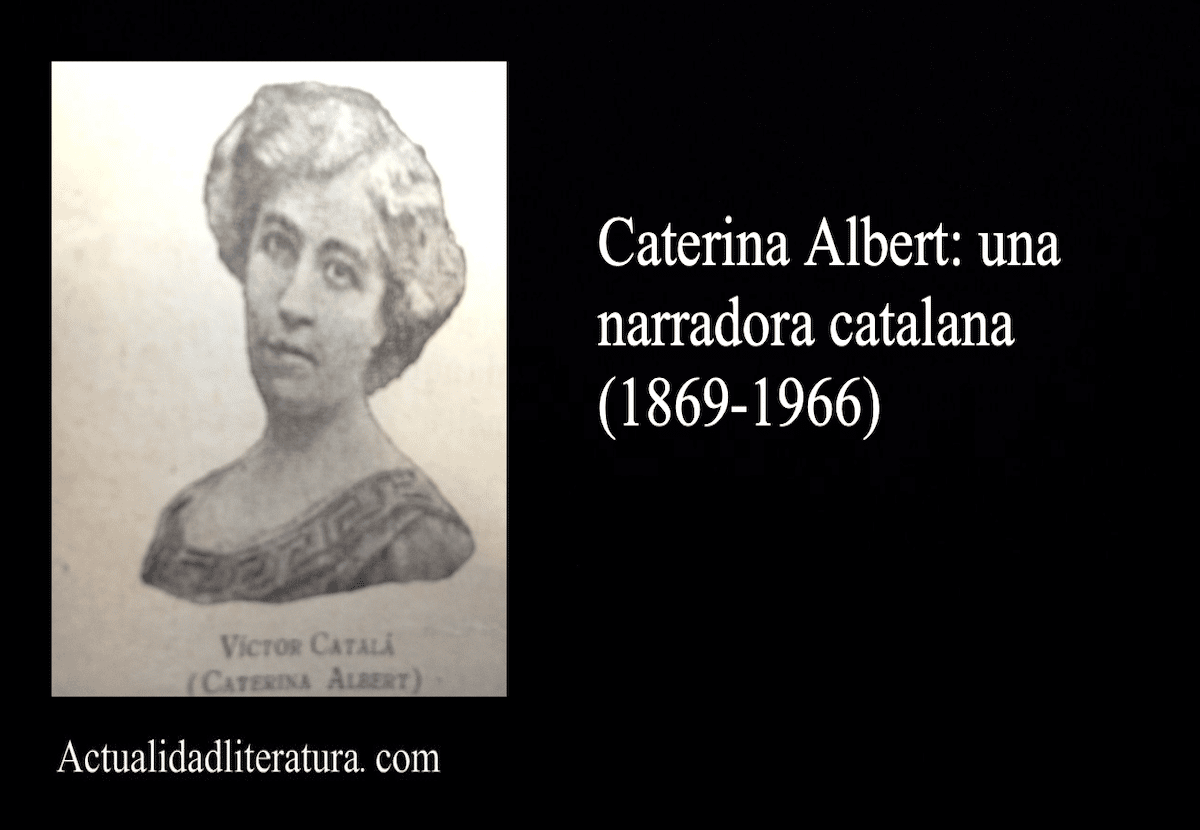
Known by the masculine nickname of Víctor Català, Caterina Albert (1869-1966) was one of those nineteenth-century writers who were daughters of an era that did not share the canon of nineteenth-century women. She maintained a creative will that contributed and inspired, entering the XNUMXth century, another century full of changes also for women, and that she was able to meet this long-lived writer.
Caterina Albert wrote in the Catalan language and made an important contribution to literature in this language, especially narrative. His novel Solitud (1905) is the best known. She is recognized by Association of writers in the Catalan language and from here we invite you to take note about this author.
Caterina Albert: the writer
He was born in l'Escala, Alt Empordà (Girona) in 1869. He came from a preponderant landowning family, for which the field was known to him and it was a theme that he frequently reflected in his works. The most famous, like Rural drains (1902) and Solitud (1905), portray those rural dramas in which the atmosphere of the people of the countryside is reflected. Also, he had the good fortune to have his own father support his artistic endeavours.. Something that surely facilitated the literary work of this writer in difficult times for it.
A great reader since she was a child, she began to write at a very early age.. She was a subscriber to the renowned cultural publication the queen of marked Catalanist ideology. He always had great curiosity and insight in the selection of his subjects and wrote cheeky texts in the context of his time.
He was a person who, in addition to literature, cultivated sculpture, painting or illustration. But it was in literature where his work was reflected, which is divided into narrative (novels and stories), poetry and also theater. She enjoyed success even if she was ignored as a playwright. He had to deal with the image of a housewife who was never married to literary work. Nevertheless, her strength as a writer was such that it provoked disbelief among those who were most critical of her.
He was a member of the Royal Academy of Good Letters of Barcelona (Royal Academy of Bones Letters of Barcelona), institution founded in 1729, and named Asset of Cultural Interest of Spain and Historical Heritage of Spain. He died at the age of 97 in 1966. She is buried in the Old Escala Cemetery.

about his work
His work has to fit within modernism and he also knew how to take advantage of the late naturalistic outburst of literature in Spain. In fact, naturalism is a powerful tool for dealing with the environment, a main element of Albert's work. Following the naturalistic line, Albert's vision is rough and rude about the elements of the countryside, its inhabitants, and about the future and destiny of women. It crystallizes the interesting determinism that characterizes naturalism. That is why destiny and despair will be a constant in his work.
It also deals with issues such as the position of women in society and their struggle towards their family, moral and labor emancipation. Violence, madness and fatalism are some other themes that she highlights in her books. Y His writing style was rated virile. She wrote abruptly for what was expected of a woman and he maintained a provocative and innovative tone in his work that filled it with great expressive force, a notable feature in his writings.
Caterina Albert always wanted to dedicate herself to doing theater, one of the genres she became interested in. Nevertheless, early in her career she was involved in a scandal with the monologue The Infanticide (1898) that caused him the distrust and objections of the theater people of his time. Caterina Albert would then devote her efforts to narrative.
As he had such a long life, his first works (poems, stories and novels) have been framed in modernism at the beginning of the XNUMXth century, with a great deal of naturalistic influence. But his work spans the entire first half of the XNUMXth century. For this reason, his literary activity from the first decades of the XNUMXth century (fundamentally narrative, with stories and novels), up to the civil war and the postwar period should also be highlighted. Some of his dialogues were valued as small theatrical pieces and have come to be represented.
His work has been translated into Spanish, English, German, Italian, French, Esperanto, Flemish, Dutch, Romanian and Czech.

Main works of Caterina Albert
- Rural drains (1902) It is made up of a collection of stories framed in the naturalistic rural environment of the late nineteenth century.
- Solitud (1905). Novel. in spanish language Soledad. It is also a rural drama, where the themes that worried Caterina Albert about women unfold through moral dilemmas, motherhood and the individualization of the female sex in freedom. Loneliness, of course, will be another great theme of this work.
- White book, polychrome, triptych (1905): set of poems.
- caires vius (1907): collection of stories within modernism.
- A film (3000 meters) (1926). Novel in which the influence and taste for the new art that arrives, the cinematographic, is seen.
- contrallums (1930). New short story anthology series.
- Altarpiece (1944). It is a compilation of short stories in Spanish.
- Mosaic (1946) is a mosaic of articles that were written since the beginning of the XNUMXth century by the author to describe her situation as a woman and a writer. A significant autobiographical work.
- Jubilee (1951) is another important collection of stories.
- In 1951 his Complete works in the editorial Selecta.
- In 2005 he appears posthumously Hardware. A thousand adagis to learn vocabulary. It is a selection of adages, or brief sentences that have an instructive character. They were chosen and extended by Caterina Albert's nephew, Lluís Albert.